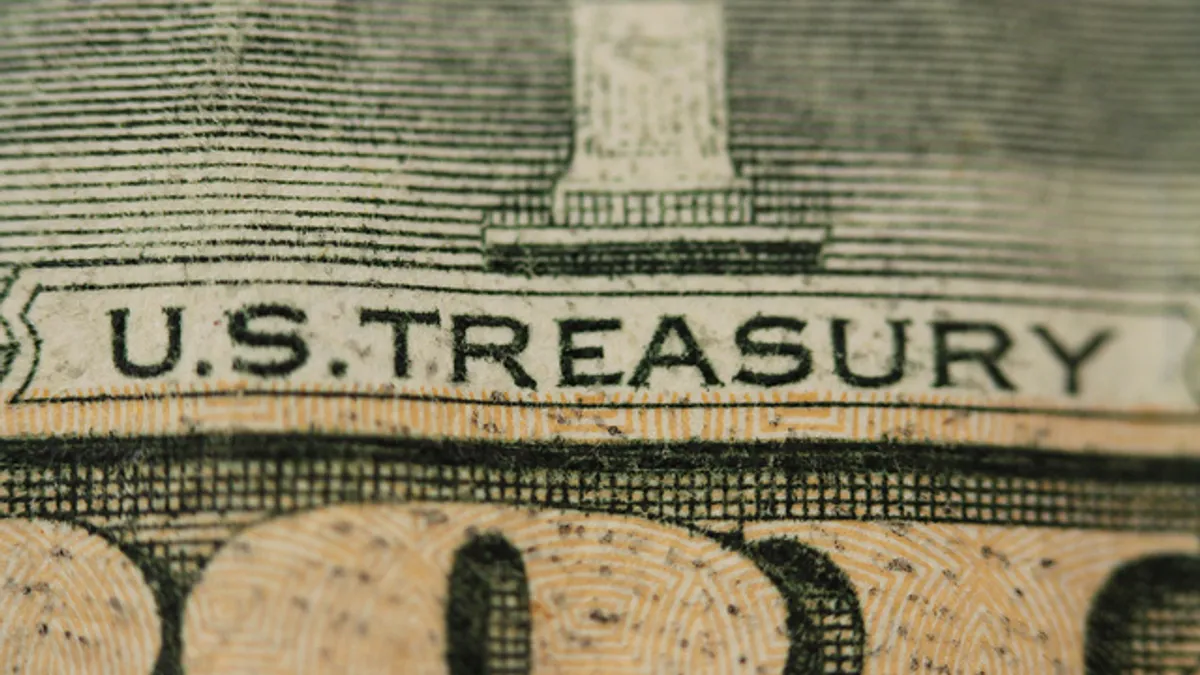Dive Brief:
- The Treasury Department expects as soon as late this week to begin approving and paying out the forgiveness requests of Paycheck Protection Program (PPP) applicants, the agency said Tuesday, according to The Wall Street Journal.
- Meanwhile, 10 trade groups — including the American Bankers Association (ABA), the Credit Union National Association, the Independent Community Bankers of America and the Bank Policy Institute — wrote a letter urging Senate and House leaders to pass a measure reauthorizing PPP funding. The program closed to new applications Aug. 8, leaving $130 billion unallocated.
- Banks expect more borrowers to inquire about commercial and industrial loans through another Federal Reserve facility — the Main Street Lending Program (MSLP) — over the next three months, but most don't anticipate lenders will be willing to hand out more loans in that time, the Fed found in a survey released Tuesday.
Dive Insight:
The Small Business Administration (SBA) has received more than 96,000 PPP loan forgiveness applications since that portal opened Aug. 10, but has approved none, William Manger, the agency's chief of staff, told House lawmakers last week, the Journal reported.
"We've submitted a number of applications," John Buhrmaster, president and CEO of Scotia, N.Y.-based 1st National Bank of Scotia, told American Banker. "We're four to six weeks into this, and we have not heard one word back."
Some banks processing the forgiveness application find it time-consuming.
"It is actually more complicated than any of us even thought," Jack Murphy, president of business banking at Citizens Financial Group, said Tuesday at a Consumer Bankers Association conference, according to the Journal. "It's taking us two weeks to process an application. Four to six contacts between small-business owners ... and the folks that are trying to process the forgiveness applications."
Other banks, including many of the nation's largest, have indicated they are waiting to see if new guidance or legislation will streamline the forgiveness process. They also want to see if Congress will pass legislation providing automatic forgiveness for loans of $150,000 or less.
The latest PPP plan, couched in a stimulus bill introduced by House Democrats, falls short of that, automatically forgiving loans of $50,000 or less and offering a simplified forgiveness application for loans between $50,000 and $150,000.
"If this is an opening salvo, it's a good first step," James Ballentine, the ABA's executive vice president of congressional relations, told American Banker. "Our goal is for them to get something done before they leave town."
Buhrmaster, meanwhile, said the $50,000 threshold "statistically doesn't make a lot of sense," adding 85% of PPP loans would benefit from $150,000 in forgiveness.
Ballentine's trade group and nine others, in their letter Tuesday, called PPP "the financial lifeline" more than 5 million small businesses "desperately needed to weather the start of the pandemic and the economic shutdown."
"As these businesses continue to recover, they will need additional resources to maintain business operations, and the PPP remains the most efficient and effective means to assist them through this challenging period," the groups wrote.
Chip Rogers, president and CEO at the American Hotel Lodging Association, was even more pointed in his request, according to American Banker. "We're asking Congress to act on the parts they can agree on," he said.
While lawmakers have sporadically proposed several initiatives to restart the program — including some that would allow some businesses to get a second loan — none has taken hold.
Treasury Secretary Steven Mnuchin told a Senate panel last week he would support simplified forgiveness, but legislation is needed. He also suggested small businesses seeking forgiveness "move quickly and fill that out and not wait for legislation," according to the Journal.
A Treasury spokesperson said applications for loans of less than $2 million are expected to be approved quickly.
About 84% of borrowers surveyed last month by the National Federation of Independent Business said they have used all of the PPP funds they were given. About 44% said they would apply for a second PPP loan if one were allowed.
Back on Main Street
Meanwhile, a Fed survey released Tuesday tried to get at the root of why the Main Street Lending Program has had such low demand. About $2 billion of an available $600 billion has been approved in the program that has taken heat from banks for the amount of risk involved. Banks are on the hook for 5% of loans made through the program. The Fed's 95% stake in the loans was itself a compromise from an earlier 85% in one of three loan categories. Some have suggested more banks would participate if the Fed took on 100%.
"Major fractions of banks of all sizes indicated that the loss sharing with the MSLP in the event of a default was too uncertain, and that the required certifications and covenants were too restrictive for the bank," the Fed found in its survey Tuesday, according to Bloomberg.
Almost 75% of respondents said they had made no Main Street loans or were not registered for the program. Banks that declined to participate in the program mentioned "their ability to provide credit to eligible borrowers without the MSLP, as well as unattractive key MSLP loan terms for lenders as reasons for not registering," the report said.
Forty-four of 86 bank senior loan officers surveyed said they had rejected some Main Street loans for companies that were "creditworthy before the COVID-19 crisis, but too severely impacted to remain viable and hence unable to repay the loan," Reuters reported.
About 68% said the program's $250,000 minimum loan threshold was not an important factor in rejecting loans or registering for the program. Some lawmakers have urged Fed Chair Jerome Powell to lower that amount, which the central bank has already done twice.











